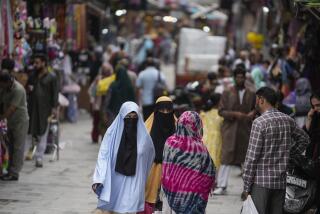Pakistan elections: Polls open amid more violence
ISLAMABAD, Pakistan -- Pakistanis went to the polls Saturday to elect a new parliament amid continued violence marring the historic event, as militants detonated a bomb outside a liberal, anti-Taliban party’s campaign office in the southern port city of Karachi, killing 10 people and injuring at least 15.
The elections mark the first democratic transition of one civilian government to another in the nuclear-armed state, which has endured a history of military coups and political ousters. The new national assembly that comes out of Saturday’s elections has the responsibility of picking a new prime minister, and charting a new course that leads the country out of economic stagnancy and militancy that has killed thousands of Pakistanis in recent years.
Members of the newly formed parliament and the provincial assemblies will also decide whether to select a new president or retain incumbent Asif Ali Zardari, an unlikely scenario if his Pakistan People’s Party performs poorly in Saturday’s polls. Zardari’s term ends in September.
The campaign became a two-way battle between the PML-N Party led by former Prime Minister Nawaz Sharif, and one-time cricket star Imran Khan, who over the past decade had failed to muster any significant political support. However, over the last year, he has morphed into a dominant political force through a campaign that relied heavily on young, urban middle class voters, social media savvy and a furious schedule of rallies attended by legions of backers.
Pakistan’s other major political player, Zardari’s ruling Pakistan People’s Party, was forced by a variety of factors to run a subdued, relatively leaderless campaign. Zardari was kept from the campaign trail by court rulings that barred him from politicking while serving in the presidency. His 24-year-old son, Bilawal Bhutto Zardari, was supposed to help lead the campaign but had to stay away because of threats to his life from militants.
During the campaign, more than 100 candidates and activists were killed in bombings and ambushes that occurred virtually daily.
The country’s homegrown insurgency, the Pakistani Taliban, focused most of its attacks on three liberal, secular parties, Zardari’s PPP, northwest Pakistan’s Awami National Party, and the Muttahida Qaumi Movement, which governs Karachi, the country’s largest city. However, during the waning days of the campaign, Taliban insurgents expanded their hit list to include rallies held by Islamist hard-line parties led by clerics with historic ties to the Taliban movement.
The violence continued Saturday after polls opened. The bombing in Karachi targeted a campaign office belonging to the Awami National Party, a Pashtun-dominated organization that has governed the volatile northwest province of Khyber-Pakhtunkwha over the last five years. Police were still investigating how the bomb attack was carried out.
“We are left at the mercy of terrorists,” said Bashir Jan, an ANP leader based in Karachi. “We are being targeted to pave the way for extremist elements and guarantors of the Taliban to contest and win the elections.”
More to Read
Sign up for Essential California
The most important California stories and recommendations in your inbox every morning.
You may occasionally receive promotional content from the Los Angeles Times.










